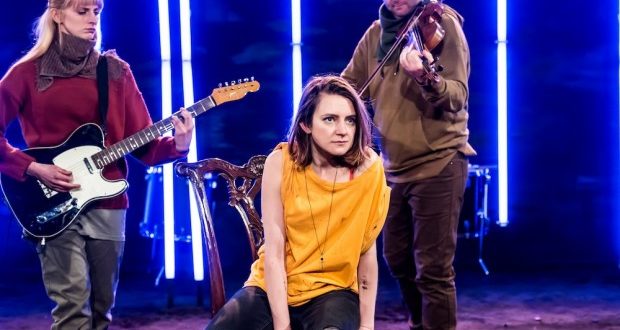Pros: The pulsating soundtrack, which is performed live on stage by the actors.
Cons: This ‘reinvention’ of the classic story is more of a superficial update, and it’s in need of a good edit.
Summary
Rating
Good
There are some brilliant moments in an overall somewhat muddled show.
Sophocles’ classic, revised by DumbWise artistic director John Ward, has received a fairly generic contemporisation; guns and car bombs have replaced swords, and Argos seems to be largely populated by angry millennials. ‘The revolution will be televised’, indeed. More remarkable is the music that underscores most of the show, performed live on stage by the cast. I’m not sure I agree with the punk-rock label DumbWise have opted to stick on it, but it’s enjoyable nonetheless. In the show’s best moments, the interplay between music and dialogue adds depth and texture to a familiar story. In other scenes, it’s not so easy to determine the additional value of the score, and there’s no denying that it sometimes adds unnecessary length to an already long show. (That said, if you’re going to tackle a 2.5 hour show anywhere, it might as well be The Bunker; the big, squishy arm chairs on the left hand side of the auditorium are insanely comfortable.)
The pace picks up in the second act which, as an added bonus, has a number of long scenes for Sian Martin’s Clytemnestra, who takes full advantage of the opportunity to present her side of the story in a lengthy TV interview. Next to her, Matt Brewer’s Aegisthus is a pretty bland affair, instead of a proper partner in crime. As a result, Electra and Orestes’ quest for revenge seems rather overblown: Aegisthus doesn’t come across as a serious enough threat to deserve his treatment, whereas Clytemnestra makes such a good case for killing her cheating, murdering husband that you can’t really blame her. Still, it’s a pleasure to see a number of complex female characters take centre stage.
Electra’s throbbing soundtrack is accompanied by an equally pulsating lighting design by Sherry Coenen, which incorporates both the strip lights that make up the bulk of the set and the little table lamps that are dotted around the auditorium. The overall picture is evocative, and when the lighting works in tandem with the music, like in the scene where Orestes consults the oracle, the effect is absolutely fab. End result: a slightly muddled show with some brilliant moments shining through.
Author: Sophocles
Adapted and Directed By: John Ward
Producer: Euan Borland
Box Office: 020 7234 0486
Booking Link: https://www.bunkertheatre.com/whats-on/electra
Booking Until: 24 March 2018
 Everything Theatre Reviews, interviews and news for theatre lovers, London and beyond
Everything Theatre Reviews, interviews and news for theatre lovers, London and beyond



